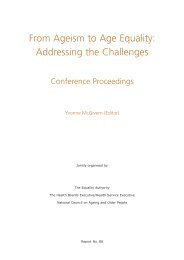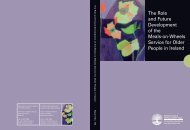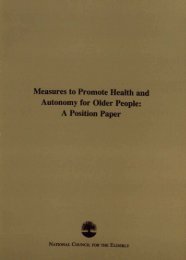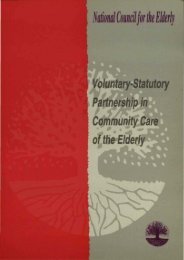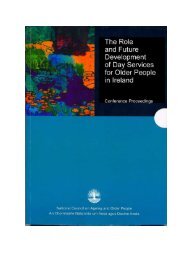Assessment of Older People's Health and Social Care Needs and ...
Assessment of Older People's Health and Social Care Needs and ...
Assessment of Older People's Health and Social Care Needs and ...
- No tags were found...
Create successful ePaper yourself
Turn your PDF publications into a flip-book with our unique Google optimized e-Paper software.
<strong>Older</strong> People in Extended <strong>Care</strong>We must plan for the appropriate, multi-disciplinary care <strong>of</strong> older people in extended care. If somebodyis going to a nursing home, it is very important to say that they will, for example, need physiotherapytwice a week or ongoing occupational therapy or review on a regular basis. If we think that somebody'sneeds are not going to be met, we need to act as advocates <strong>and</strong> let the CEO <strong>of</strong> our health board knowabout the likely failure to meet ongoing therapy <strong>and</strong> care needs in institutional care.If we do assess a patient <strong>and</strong> find that it is appropriate for her to go to a nursing home, but that sheneeds ongoing care, whom do we advise about the details <strong>of</strong> that care? At the moment, there is norequirement for medical <strong>of</strong>ficers with specialist knowledge <strong>of</strong> older people's needs in nursing homes.There is no requirement that nursing <strong>and</strong> other staff should have specialist training in gerontologicalcare <strong>and</strong> no requirement for a therapy complement. These are all changes we must push for.Financial AspectsThe nursing home financial regulations are unjust <strong>and</strong> unethical. Irish geriatricians have formallyexpressed this view to the Department <strong>of</strong> <strong>Health</strong> <strong>and</strong> Children l3 <strong>and</strong> it is probable that the civilservants are unhappy with the regulations as well. The Nursing Home Act was enlightened for itstime, but the politicians drew back when it came to addressing the financial regulations <strong>and</strong> they leftit to the civil servants. The main issue here is that it is not our business to be means-testing ourpatients. If we think that the financial regulations are unethical, then it is important to advocate onbehalf <strong>of</strong> patients through our pr<strong>of</strong>essional bodies.----------Finally, we are all pr<strong>of</strong>essionals <strong>and</strong> need to act as pr<strong>of</strong>essionals. We should not accept fUdge or fluffylanguage, (i.e., multi-disciplinary teams which are oligo-disciplinary, unhelpful slogans like 'too muchemphasis on the biomedical model'). If we do, we send out the message that our academic credentialsare not as good as they should be. That applies to evaluations in particular. We need real evaluationwhich are solidly based in good health services methodology rather than the consumer preferencestudies which have <strong>of</strong>ten posed as evaluation up to now. Such evaluations will give us a valid view <strong>of</strong>whether or not our therapeutic interventions have been effective. There should be zero tolerance forinadequate teams. We need a balance between both specialist <strong>and</strong> generalist approaches in our work.Lastly, we must keep the older person's own preferences at the core <strong>of</strong> our work.13. O'Neill, D., Gibbon, J., Mulpeter, K. on behalf <strong>of</strong> the Irish Society <strong>of</strong> Physicians in Geriatric Medicine. 'Responding tocare needs in long term care: a position paper by the Irish Society <strong>of</strong> Physicians in Geriatric Medicine', Ir Med J, 2001,94,72.Conference Proceedings







